
Ventricose is an adjective describing the condition of a mushroom, gastropod or plant that it is "swollen, distended, or inflated especially on one side". [1]

Ventricose is an adjective describing the condition of a mushroom, gastropod or plant that it is "swollen, distended, or inflated especially on one side". [1]
In mycology, ventricose is a condition in which the cystidia, lamella or stipe of a mushroom is swollen in the middle.
In gastropods, if the shell of a snail is ventricose or subventricose, it means the whorl of the shell is swollen.
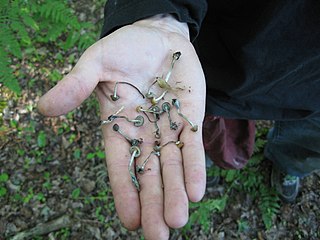
Psilocybe quebecensis is a moderately active hallucinogenic mushroom in the section Aztecorum, having psilocybin and psilocin as main active compounds. Native to Quebec, it is the most northern known psilocybin mushroom after Psilocybe semilanceata in northern Scandinavia. Macroscopically this mushroom somewhat resembles Psilocybe baeocystis.

Gymnopilus luteofolius, known as the yellow-gilled gymnopilus, is a large and widely distributed mushroom that grows in dense clusters on dead hardwoods and conifers. It grows in late July to November in the east and in the winter on the west coast of North America. It has a rusty orange spore print and a bitter taste.

Pluteus salicinus is a European psychedelic mushroom that grows on wood. It is an edible mushroom after parboiling.
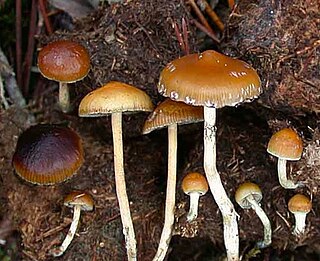
Psilocybe fimetaria is a psilocybin mushroom, having psilocybin and psilocin as main active compounds. It grows exclusively on horse and cow dung.
Gymnopilus luteus, known as the yellow gymnopilus, is a widely distributed mushroom-forming fungus of the Eastern United States. It contains the hallucinogens psilocybin and psilocin. It is often mistaken for G. speciosissimus and G. subspectabilis.

Turbo marmoratus, known as the green turban, the marbled turban or great green turban, is a large species of marine gastropod with a thick calcareous operculum in the family Turbinidae, the turban snails.
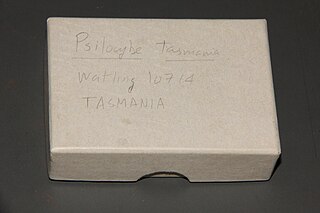
Psilocybe tasmaniana is a species of coprophilous agaric fungus in the family Hymenogastraceae. It was described by Gastón Guzmán and Roy Watling in 1978 as a small tawny orange mushroom that grows on dung, with a slight blueing reaction to damage, known only from Tasmania and southeastern Australia. It was likened to Psilocybe subaeruginosa although characteristics, appearance, and the association with dung were not typical for that species. As a blueing member of the genus Psilocybe it contains the psychoactive compounds psilocin and psilocybin.

Pilsbryspira umbrosa is a species of sea snail, a marine gastropod mollusk in the family Pseudomelatomidae.

Choristella tenera is a species of sea snail, a marine gastropod mollusk in the family Choristellidae.

Turbo cornutus, common name the horned turban, is a species of sea snail, marine gastropod mollusk in the family Turbinidae.
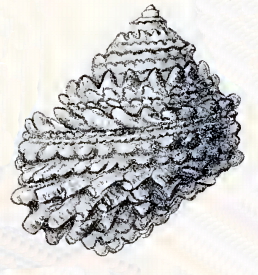
Turbo squamiger is a species of sea snail, marine gastropod mollusk in the family Turbinidae.
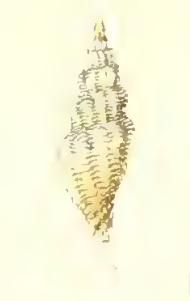
Vexillum lucidum, common name the lucid mitre, is a species of small sea snail, marine gastropod mollusk in the family Costellariidae, the ribbed miters.

Aureoboletus auriflammeus, commonly known as the flaming gold bolete, is a species of bolete fungus in the family Boletaceae. Described as new to science in 1872, it is found in eastern North America, where it grows in a mycorrhizal association with oaks. The caps of the fruit bodies are golden orange, with a yellow pore surface on the underside, and a reticulated (network-like) stem. The edibility of the mushroom is not known.

Ethminolia glaphyrella is a species of sea snail, a marine gastropod mollusk in the family Trochidae, the top snails.

Milda ventricosa, common name the ventricose pyram, is a species of small to medium-sized sea snail, a marine gastropod mollusk in the family Pyramidellidae, the pyram snails.
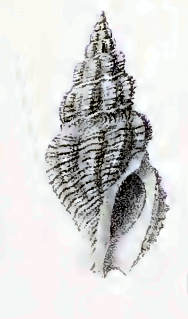
Drillia recordata is a species of sea snail, a marine gastropod mollusk in the family Drilliidae.

Anacithara lita is a species of sea snail, a marine gastropod mollusk in the family Horaiclavidae.

Pleurotomella lucasii is a species of sea snail, a marine gastropod mollusk in the family Raphitomidae.

Probuccinum archibenthale is a species of sea snail, a marine gastropod mollusk in the family Buccinidae.

Urosalpinx curtansata is an extinct species of sea snail, a marine gastropod mollusk in the family Muricidae, the murex snails or rock snails.